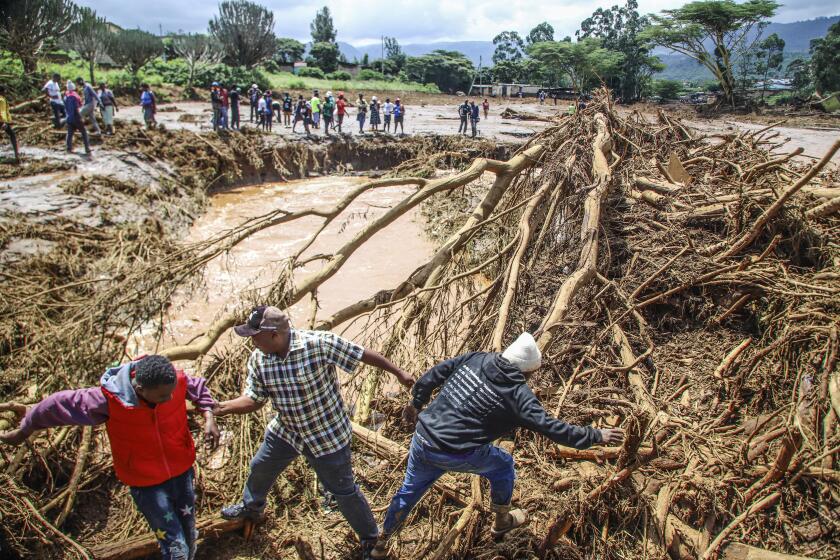German police, protesters clash before G-8 summit
Sporadic violence erupted Saturday in this port city as radicals, their faces hidden by hoods and bandannas, broke from a largely peaceful anti-globalization protest and attacked police with sticks, bottles and Molotov cocktails ahead of this week’s summit of leading industrialized nations.
Authorities said 146 police officers were injured, 25 of them seriously; 78 demonstrators were arrested or taken into temporary custody. About 14,000 officers lined the streets and harbor as helicopters skimmed overhead and boats patrolled the waters in one of Germany’s tightest security operations since the end of the Cold War.
The city had been bracing for up to 100,000 demonstrators, but police estimated the crowd at 25,000. Protest organizers said the turnout was 80,000. Even that number would have been well short of expectations for an event billed as a kickoff to a series of protests leading to the Group of 8 meeting, which starts Wednesday in the nearby resort of Heiligendamm. President Bush and other world leaders have yet to arrive.
Carrying backpacks and banners, the protesters, including anarchists, peaceniks, unionists, communists and Boy Scouts, descended here under the motto “Another world is possible.”
Demonstrators criticized the U.S., Germany and other nations over war, global warming, exploitation of Third World labor and failure to stop the spread of AIDS or relieve African nations of their huge debts.
“I’m not actually against globalization, but I don’t want a ‘Club of Riches’ like the G-8 to manage it,” said Gerda Finke, a pensioner from Rostock. “The way we have given foreign aid to the developing world for the last 30 years can’t go on like this. The African countries, for example, are being exploited by their debts.”
The demonstrators assembled in tent camps and fields and then moved toward Rostock, where they followed two routes before joining at the harbor for speeches and rock music. The scene was an ideological patchwork of symbols and icons streaked with tear gas and smoke from burning cars.
Placards of Latin American Marxist revolutionary Che Guevara bobbed amid signs that read, “Welcome to the Central Committee of Capitalism: Osama W. Bush and Gas Putin” and “Those who don’t take from the Rich can’t give to the Poor.”
Leaflets handed out by demonstration organizers accused G-8 members -- the U.S., Britain, Canada, France, Germany, Italy, Japan and Russia -- of being aloof to international problems.
“The world shaped by the dominance of the G-8 is a world of war, hunger, social divisions, environmental destruction and barriers against migrants and refugees,” the leaflet says. “We want to protest this and show the alternatives.”
Security officials said 2,000 violent anarchists and radicals had infiltrated the demonstration in Rostock. By dusk, police used water cannons to isolate gangs of stone-throwing demonstrators downtown. A police spokesman told German media that a number of protesters were “definitely seeking a confrontation with police.”
A protest organizer, Monty Schaedel, said, “If 20 police officers equipped with heavy combat suits, helmets and rubber bats go into a crowd of 1,000 demonstrators, this can only be understood as a provocation.”
In recent weeks, police raided the offices of left-wing organizations and were criticized by constitutional rights groups for lifting “scent samples” from suspected militants so dogs could track them in crowds.
Authorities also banned a planned neo-Nazi anti-globalization march in Schwerin, about 40 miles southwest of Rostock, fearing that violence would break out between right- and left-wing extremists. Police in the region said that most of their units had been sent to Rostock and that they were understaffed and unable to secure a second rally.
Karsten Steinbrenner traveled from Austria to march in the demonstration. His purpose, he said, was simple. “I’m from the environmental movement. We have to do something on global warming. Now. Urgently. Otherwise beautiful Rostock won’t be on the Baltic Sea in 50 years. It will be in the Baltic.”
christian.retzlaff@latimes.com
jeffrey.fleishman@latimes.com
*
Retzlaff reported from Rostock and Fleishman from Berlin.
More to Read
Start your day right
Sign up for Essential California for news, features and recommendations from the L.A. Times and beyond in your inbox six days a week.
You may occasionally receive promotional content from the Los Angeles Times.







